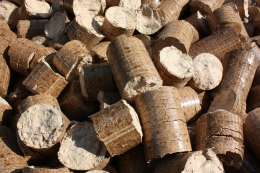
Pellets and pellet fuels are made from compressed organic matter, or biomass. Pellets can be made from any one of five general categories of biomass, including: industrial waste and co-products, food waste, agricultural residues, energy crops and virgin wood. They can be used as fuels for power generation, commercial or residential heating, and cooking.
Wood pellets are the most common type of pellet fuel and are generally made from compacted sawdust and related industrial wastes from the milling of lumber, manufacture of wood products/furniture, and construction. Pellets are categorized by their heating value, moisture and ash content, and dimensions. Pellets are extremely dense and can be produced with a low moisture content (below 10%) that allows them to be burned with a very high combustion efficiency.
Waste to Energy
BTU (British Thermal Unit), Ton
Massachusetts Division of Energy Resources - Wood Pellet Heating Guide (PDF)
You have no items in your list.
Click or tap on the My List stars on any business card or profile to add or remove organizations.